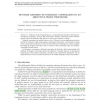163 search results - page 10 / 33 » Computationally Convincing Proofs of Knowledge |
ICLP
2010
Springer
13 years 6 months ago
2010
Springer
Abductive Logic Programming is a computationally founded representation of abductive reasoning. In most ALP frameworks, integrity constraints express domainspecific logical relati...
TARK
2009
Springer
14 years 2 months ago
2009
Springer
The logical omniscience feature assumes that an epistemic agent knows all logical consequences of her assumptions. This paper offers a general theoretical framework that views log...
FOCS
2003
IEEE
14 years 28 days ago
2003
IEEE
We show how a polynomial-time prover can commit to an arbitrary finite set Ë of strings so that, later on, he can, for any string Ü, reveal with a proof whether Ü ¾ Ë or Ü ...
MKM
2005
Springer
14 years 1 months ago
2005
Springer
Abstract. We present a computational origami construction of Morley’s triangles and automated proof of correctness of the generalized Morley’s theorem in a streamlined process ...
ESORICS
2005
Springer
14 years 1 months ago
2005
Springer
Abstract. Formal methods have been extensively applied to the certification of cryptographic protocols. However, most of these works make the perfect cryptography assumption, i.e....

